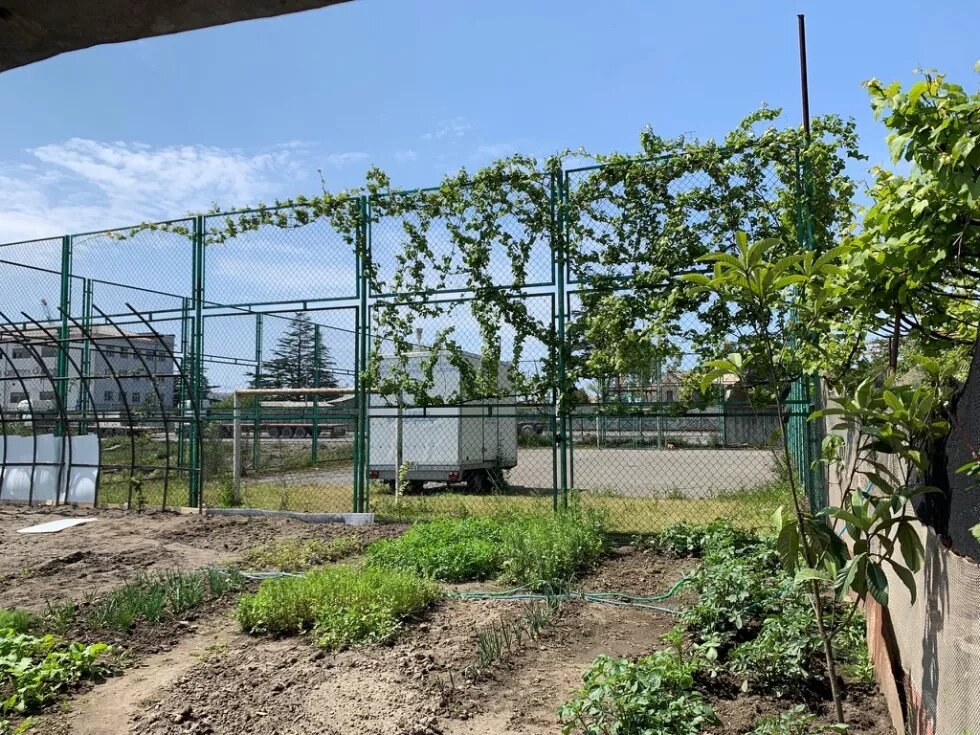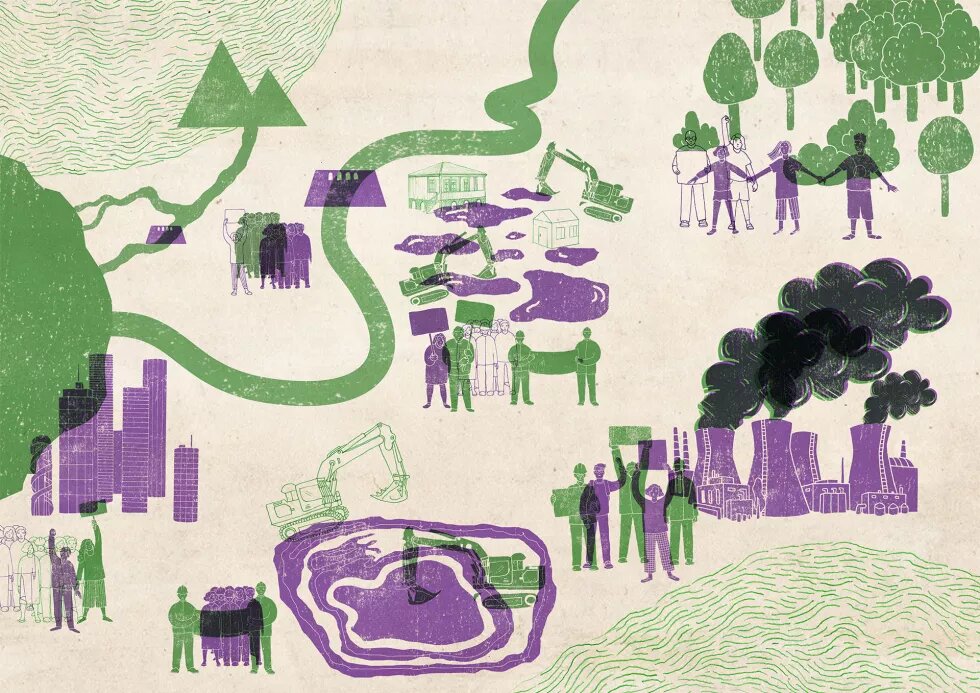
What is the relationship between ecological information and environmental crises? What role does scientific competence – or a lack thereof – play in ecological management and environmental policy? What political, economic, and technological factors contribute to the emergence of major gaps in environmental information and knowledge in post-Soviet Georgia? This article attempts to elaborate on these questions and to shed light, through the discussion of ongoing environmental crises in Poti and Chiatura, on the ways in which the acute scarcity of local environmental information and competence has become both a cause and a symptom of Georgia’s environmental inequities.

Poti
For almost two years, a mobile air quality monitoring station set idle on a small, artificial-turf football stadium bordering two apartment blocks on Javakhishvili Street in Poti. Beginning in July of 2020, the station, installed and managed by the National Environmental Agency (NEA), gathered data on local air quality. But its deployment only lasted five months, until January of 2021, when representatives of the NEA decided to shut it down. In a response to a FOIA inquiry on the decision, the agency explained, that “despite multiple attempts and requests, due to resistance from local residents, the NEA was unable to inspect the station and provide maintenance services required by compliance standards and the station’s manual. Moreover, since December [of 2020] the station had been working in the “warning” regime, which meant that the NEA could no longer consider the data transmitted by the air quality monitoring station as reliable…” The NEA indicated that resistance from Javakhishvili’s residents prevented the representatives of the Poti municipality and the NEA from carrying on routine maintenance, endangering the expensive station. Therefore, “on January 22, 2021, the NEA decided to turn off the air quality monitoring station.”[1] The station, kept unused and trapped on the pitch, stayed on location for 22 months and was finally transported to Tbilisi on October 20, 2022.
The NEA sent the air quality monitoring station to Poti after blood tests in the community revealed excess lead in the samples of some of the children living on Javakhishvili Street. Air pollution had been a widespread and long-standing concern in Poti. But starting in 2019 the issue became especially alarming near a recently opened port terminal on Javakhishvili Street. With the help of a local non-governmental organization, locals began to look for funding needed to conduct health screenings. They received funding to test twenty local children and excess lead was present in half of the samples. In 2021 they petitioned the local government to set up a larger study and the municipality complied. This time, 104 children were tested for lead and the presence of excess amounts was confirmed in 33 cases.
The quality of the study conducted, however, left much to be desired. The National Center for Disease Control and Public Health, which possesses the competence and the responsibility to conduct such community surveys, was not involved in setting up the study’s methodology and the sample size of 104 was not sufficient for a representative assessment. But most troublingly, when discussing the procedure for sample selection, a representative of the local government explained that “the municipality had taken the concerns of the Javakhishvili residents into consideration and 52 children were selected from that area. The other half of the sample came from Maltakva – an area considered relatively ‘clean’.” The explanation betrayed the study’s makeshift, unscientific quality.
Identifying and understanding possible connections between environmental pollution and public health outcomes requires a detailed, multidimensional study relying on an appropriate sample selection methodology and combined medical and environmental data. Without a proper epidemiological study and only patchy data from the air quality monitoring station both the cause and the effect sides of the air pollution problem in Poti remain shrouded in uncertainty.
Chiatura
On October 10, 2022, an inter-agency working group tasked with studying the cause of a landslide that occurred in Itkhvisi – a village in the Chiatura municipality – released its final report. The landslide that occurred in March had made the homes of ten local families uninhabitable and severely damaged tens of other properties in the village. Itkhvisi’s residents blamed the landslide on Georgian Manganese and its mining operations in Chiatura, but the mining company denied responsibility, indicated that it operated no active mines in or around the village, and claimed that mining in the area had ceased by the 1980s. The local government and the Ministry of the Economy in Tbilisi set up an inter-agency task force to evaluate the damage and identify its cause. After a seven-month investigation, the task force divided affected homes into three categories, recommending the “relocation of 34 families to a geologically stable area.” The report cited multiple factors that had contributed to the landslide: “The commission determined that the landslide must have been caused by a combination of these circumstances: (1) underground cavities left over by mining operations in the previous century (anthropogenic impact); (2) unstable nature of bedrock under the village; (3) extreme precipitation.”[2]
The report is as full of cavities as the ground underneath Itkhvisi’s sinking homes. In fact, methodologically the report can be described as a sixty-page attempt to compensate for nonexistent or inaccessible information with an extrapolation of the few datapoints the group was able to gather: because there is no meteorological station in or near Itkhvisi, the authors had to rely on precipitation data from Sachkhere, a different municipality; instead of constructing a full, three-dimensional image of Itkhvisi’s underlying geology, they had to rely on a single, linear geophysical profile; because archival records of historic mining operations could not be located, they had to assess the extent of past mining activities in the area through newspaper clippings. As a result, the report has come under criticism from the local community and geologists.[3]
The Struggle for Data
In Poti, on a street neighboring a massive new port terminal, in the midst of an acute environmental conflict during which local residents protested and demanded a study of their living environment, a mobile air quality monitoring station set idle and did not collect data. In Chiatura, where a landslide in March provided locals with a stark reminder that their homes might – due to current or past mining operations – be profoundly unstable and thus unsafe, a report meant to shed light on local geologic conditions raised more questions than it was able to answer - questions concerning not just the events of March, but also the general willingness and ability of the local government to understand, monitor and address the ecological and geological legacy of mining.
The two cases point to a shared problem that has been central to many, if not most, recent environmental conflicts in Georgia. Georgia’s current environmental crises contain, reveal, and create deep and troubling gaps in environmental knowledge and information that produce profound environmental inequities and complicate efforts to understand and address pollution, mining-related hazards, the impact of climate change and other environmental problems.
Local and national environmental movements in Georgia emerge, in large part, in response to the absence or insufficiency of fundamental environmental information. Calls for data collection and publication, for studies and transparency often appear as core demands of environmental activism. As a result, environmental conflicts become epistemic struggles over contested knowledge claims, disputed competence and information deemed inaccurate or unreliable. The “Save the Rioni Valley” movement, perhaps the single largest environmental resistance movement of recent years, falls into this category as representatives of the movement repeatedly questioned the quality of the hydropower project’s documentation, highlighted the lack of key studies, drew attention to the project’s unsubstantiated justification and demanded access to full project information. In Rustavi, the air-pollution focused “Gavigudet” movement has turned the call for better air quality monitoring practices into its primary demand. It has also produced accessible and creative content through which it publicizes existing air quality information, drawing attention of the national public. Gavigudet has thus created a revealing example of how environmental data collection has become both a goal and an instrument of advocacy and mobilization for Georgia’s environmentalists.
The Shortage of Environmental Information
The shortage of environmental information is thus central to the landscape of green activism in Georgia – this deficit is one of the primary structural factors that environmental groups must address and accommodate, and with which they have to cope. Gaps in ecological data and information are a result of interacting structural, political, and economic conditions. Understanding and articulating the forces that have produced its acute epistemic deficit could thus help contextualize Georgia’s environmental politics within its recent history. But before we move on, it is important to come up with a clearer definition of what we have been referring to as “ecological” or “environmental information.”
What we have simply referred to as “ecological information” includes three distinct but overlapping dimensions – data, competence, and transparency. “Data” refers to geologic, climatic, biological, hydrological, and other information that can be collected on the current and past ecological states. The collection of such data requires technical infrastructure and scientific institutions under the aegis of the state or academia. Evidence-based, sensitive, and competent environmental policymaking, which can observe ecological conditions and understand emergent risks, requires accurate, detailed, and multidimensional data. Without being informed by such data, regional and national policymaking can be neither effective, nor sustainable.
Discussing the example of hydrology, a preliminary assessment by the UNDP’s Green Climate Fund underlines the dearth of this kind of data in Georgia: “Georgia has a long history and extensive technical know-how in the hydrometeorology and geological monitoring. However, financial and human resources constraints coupled with a severely reduced monitoring network limits its ability to monitor important variables and parameters at the appropriate spatial and temporal scales […] there is no definitive hazard, risk or vulnerability mapping for Georgia for any of the hydro meteorological hazards that it faces and the technical and financial capacity to undertake such mapping is lacking.”[4] According to the same assessment, in terms of its ability to cope with disasters, Georgia ranked 139th out of 191 countries.
The lack of such data and evidence-based environmental planning were directly responsible for the deadly flood of June 13, 2015 in Tbilisi. A study of the circumstances that led to the disaster reveals that the primary cause of the catastrophic outcome was the “the lack of foresight and evidence-based decision-making that led to the intensive spatial development of the territory.”[5] The assessment explains that if the infrastructure around the Vake-Saburtalo highway had been planned with the peak hydrological discharge in mind, “the tragedy of the Svanidze Street would have been avoided.” The assessment lamented the fact that at the time of writing there were no meteorological stations in the Vere basin.
The area has since been equipped with an early warning system, but the state of the hydrometeorological monitoring network as a whole and its recent history is a revealing case study in the decline of Georgia’s institutional capacity in environmental monitoring. According to a white paper prepared by the World Bank, “Georgia reached its peak capacity of hydrological stations monitoring water level and discharge in 1980, when it possessed 152 stations. In the subsequent period the network capacity was first reduced to 105 stations and eventually reached its minimum of 21 stations in 2007.”[6] Even if Georgia follows through with its plan of expansion, in 2025 the number of stations in its network will only reach two thirds of the historical maximum. The shrinking of the hydrological monitoring network is a symptomatic example of the overall decline in Georgia’s institutional ability to observe and understand the natural environment.
Our focus in this paper is on ecological information, but it is also important to note that the epistemic ecosystem required for informed environmental policymaking is not limited to such data. Environmental competence and the issues of transparency and the accessibility of environmental information also play crucial roles.
“Environmental competence” implies the institutional and scientific capacity to observe and study the natural environment. This capacity is necessarily interdisciplinary and relies on input from a wide variety of sciences, including ecology, biology, physics, chemistry, geology and more. Environmental competence of Georgia’s public institutions depends on the strength and depth of these and other fields. Current dearth of environmental expertise is thus partly a consequence of a lack of research opportunities in related disciplines. “Transparency” implies the unity of norms and practices that determine the accessibility of environmental information and data. Public institutions might be competent but opaque - they might have ecological information but be unwilling to share it. Corporate and authoritarian systems can generate massive amounts of environmental information but make none of it available for public purposes. Thus, when discussing the overall state of environmental data and knowledge production in Georgia, it is crucial to assess not only the existence of data per se, but also the norms and practices regulating its dissemination and accessibility.
Neoliberalism and Strategic Ignorance
“In shaping environmental policy, knowledge is power,” writes Laurie Parsons, a scholar at the University of London. “Yet the opposite is also true. Control over the absence of knowledge facilitates certain policy outcomes being deflected, obscured, or magnified in a way that furthers political, personal, or institutional ends.”[7] Environmental policymaking and the management of natural resources necessarily involves numerous institutions, bureaucracies and commercial and public actors operating on various scales. Environmental information flows – or is prevented from flowing – through these institutional channels. It can be diverted, agglomerated, produced, or obscured, with important consequences: “the power of these bureaucratic circuits to overlook or elide certain types of environmental knowledge creation, be it generation, sharing or dissemination, plays a major role in controlling environmental narratives and thus shaping the policies that result.”[8]
The conscious neglect of ecological information and deliberate non-collection of environmental data can be understood as an example of “strategic ignorance.” Linsey McGoey summarizes this strategy in her Logic of Strategic Ignorance: “Ignorance and knowledge are often thought of as opposite phenomena. Knowledge is seen as a source of power, and ignorance as a barrier to consolidating authority in political and corporate arenas. [But ignorance can also serve] as a productive asset, helping individuals and institutions to command resources, deny liability in the aftermath of crises, and to assert expertise in the face of unpredictable outcomes.”[9] McGoey writes that politically, legally, and commercially it is sometimes more advantageous to claim the least knowledge, to assert that one possessed the least amount of information. In such contexts, ignorance, and the state of being uninformed are not a disadvantage - it is a strategic choice.
But the logic of strategic ignorance alone does not explain the limited capacity of Georgia’s institutions responsible for environmental data collection. The policy of underfunding scientific capacity – withholding resources, both financial and technical, from scientific institutions – is a direct consequence of neoliberal policies of the past few decades. If natural resources are to be managed according to the dictates of the free market, the only information truly necessary for the process is that which commercial actors gather and analyze. Neoliberalism has a profound impact on the way environmental knowledge is produced and distributed and it is not limited to the general underfunding of science. It also includes the concentration of environmental competence and information in the commercial sphere. Cases in which governments point to the capacity and interests of private entities in justifying development projects – as opposed to claiming the reliability of public entities approving them – is one reflection of this neoliberal dynamic.
The neoliberal regime of knowledge production affects not just the distribution and accessibility of ecological information, but also the very nature of environmental competence and data.[10] Information and knowledge gathered for a commercial purpose differ from those collected by a scientific or public entity: a hydrologist publishing a paper and her colleague employed by a hydropower developer seem to be studying the same river, but they approach and represent it through radically different perspectives.
Environmental conflicts in Poti and Itkhvisi reflect the logic of strategic ignorance. They also reveal the epistemic gaps produced by the neoliberal policy of underfunding fundamental science. This need not mean that public agencies involved necessarily and deliberately preclude the collection of environmental data. Rather, the logic of strategic ignorance is reflected in the structure of national and regional environmental policymaking that leaves affected communities with questions and doubts, as opposed to answers and reliable information, regarding the state of their environment and its impact on their lives. Instead of providing answers, the policy sows doubt and uncertainty. This shroud of ignorance makes it easier to overlook environmental crises, and to evade legal responsibility.
Environmental Ignorance and Its Repercussions
Strategic environmental ignorance makes it easier to ignore or even reject the existence of environmental problems and their consequences. What is not articulated, quantified, measured, and expressed as financial or economic loss is readily dismissed. This sets up the preconditions for making environmental harm – and, by implication, social harm – invisible. Loss of life and living standards, damage done to ecosystems and communities is thus conveniently excluded from the political and economic accounting. For example, when arguing against environmental regulations, big business regularly points to the costs of regulation. Naturally, imposing environmental regulations carries a cost, creating a burden that businesses, and perhaps consumers, would have to shoulder. But this equation, when it makes an appearance in the public arena, is often lop-sided – it often excludes the costs of not imposing and of not enforcing environmental regulations. An extra filter an industrial factory might have to install costs money, but not installing a filter has costs of its own as well. But this cost, which does not show up in commercial accounting, is covered socially, by affected communities in the short and the long term. This cost can be gleaned in devalued property, in the degradation of the standard of living, in increased medical expenditures. But strategic ignorance makes this part of the equation invisible, creating the impression that environmental regulation is costly, even a luxury, while deregulation is economically prudent.
Environmental ignorance might create comfortable conditions for polluters and those responsible for environmental quality, but it creates daily practical challenges for environmental organizations. Strategic litigation – including in Poti and Itkhvisi – requires evidence of cause and effect. Establishing these links is only possible through expensive research, trained specialists, and painstaking data collection. Mining companies and polluters are quick to point out gaps in knowledge and certainty, as it often helps them in denying or avoiding their liability. Production of reliable information and knowledge, free from political or commercial influence, requires independent, competent scientific organizations. Without them, scientific expertise is either exported or concentrated in the corporate world, leaving environmental organizers with little to build their case.
Environmental organizations and activists struggle with a lack of information in their advocacy beyond the courtroom just as much as inside it. Environmentalists are often asked to provide “proof” of the expected negative consequences of a project they might be objecting to. This reversal of the burden of proof, which liberates developers from demonstrating the safety and sustainability of their plans, tasks environmentalists with gathering, analyzing, and presenting vast, interdisciplinary information, which is often non-existent or inaccessible. Gaps in environmental information and knowledge thus degrade the overall quality of public environmental deliberation.
***
In the 1980s – and especially after the Chernobyl catastrophe – two sociologists, Anthony Giddens and Ulrich Beck, began writing about the complex anthropogenic hazards that seemed to be overwhelming the public and political life of industrial (and post-industrial) societies. Modern technology and globalized chains of production and consumption had combined to generate systemic vulnerabilities with which the political system seemed unable to cope. Giddens and Beck pointed out that risks related to finance, technology, industry and ecology – political and financial crises, explosions, disasters – disrupted lives with increasing frequency and intensity. They named the society that inhabits this world of anthropogenic hazards “Risk Society.” “Modern society has become a risk society,” Beck wrote in his 1986 Risk Society: Towards a New Modernity, “in the sense that it is increasingly occupied with debating, preventing and managing risks that it itself has produced.”[11]
Georgia has been left without key environmental information and competence at an unfortunate historical moment. In a world of excess anthropogenic risk, when climate change is breeding catastrophic hazards on a planetary scale, a lack of ecological data and expertise is particularly alarming. According to the Fourth National Communication of Georgia, submitted to the United Nations Framework Convention on Climate Change in 2021, over the past three decades mean annual temperature in Georgia has risen by 0.47° C.[12] Precipitation has increased in Georgia’s west and decreased in the east. The document predicts that the impact of climate change will make floods, landslides, droughts, heat waves, extreme temperature and forest fires more frequent and intense, while changes in the length of the growing season, soil erosion and the melting of glaciers will add further uncertainty.
Ignoring the impact of climate change creates a dangerous terrain for economic and social life in Georgia. Whether Georgia will be able to cope with consequences or not will depend on its capacity to adapt and prevent. Sensitivity to the natural environment and the ability to observe its rhythms and its disruptions form the bedrock of adaption capacity. Strategic ignorance might provide benefits to those who deploy it to deflect responsibility, but this relative advantage pales in comparison to the risks that environmental ignorance and the lack of ecological competence pose to the Georgian society as a whole.
Content of the publication is the sole responsibility of the author and can in no way be taken to reflect the views of the Heinrich Boell Foundation Tbilisi Office – South Caucasus Region.
[1] NEA response, N21/318. 2022.
[2] The Report of the Special Commission Investigating the Geodynamic Events of March 2022 in Itkhvisi. October 10. 2022
[3] For more on the shortcoming of the report, see discussion available at this link.
[4] Scaling-up Multi-Hazard Early Warning System and the Use of Climate Information in Georgia; Green Climate Fund. UNDP. 2017
[5] The Flood of June 13, 2015, in the Vere Basin. Austrian Development Cooperation & CENN. Tbilisi. 2015.
[6] Strengthening Hydrometeorological and Early Warning Systems and Services in Georgia – Guidelines. World Bank & GFDRR. 2019
[7] Parsons, Laurie. "Strategic environmental ignorance: Antipolitical knowledge gaps from drought measurement to adaptation in Cambodia." Environmental Science & Policy 136 (2022): 261-269. Harvard
[8] ^ibid.
[9] McGoey, Linsey. "The logic of strategic ignorance." The British journal of sociology 63, no. 3 (2012): 533-576.
[10] Lave, Rebecca. "Neoliberalism and the production of environmental knowledge." Environment and Society 3, no. 1 (2012): 19-38.
[11] Beck, Ulrich, and Brian Wynne. Risk society: Towards a new modernity. Vol. 17. sage, 1992.
[12] Fourth National Communication of Georgia. UNFCCC. 2021

